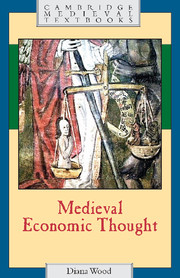Book contents
- Frontmatter
- Contents
- Preface
- List of abbreviations
- Introduction: problems, evidence, and background
- 1 Private property versus communal rights: the conflict of two laws
- 2 Wealth, beggary, and sufficiency
- 3 What is money?
- 4 Sovereign concerns: weights, measures, and coinage
- 5 The mercantile system
- 6 The just price and the just wage
- 7 The nature of usury: the usurer as winner
- 8 The theory of interest: the usurer as loser
- Conclusion
- Appendix: Notes on the main writers and anonymous works mentioned in the text
- Glossary of terms
- Select bibliography
- Index
- Cambridge Medieval Textbooks
3 - What is money?
Published online by Cambridge University Press: 05 June 2012
- Frontmatter
- Contents
- Preface
- List of abbreviations
- Introduction: problems, evidence, and background
- 1 Private property versus communal rights: the conflict of two laws
- 2 Wealth, beggary, and sufficiency
- 3 What is money?
- 4 Sovereign concerns: weights, measures, and coinage
- 5 The mercantile system
- 6 The just price and the just wage
- 7 The nature of usury: the usurer as winner
- 8 The theory of interest: the usurer as loser
- Conclusion
- Appendix: Notes on the main writers and anonymous works mentioned in the text
- Glossary of terms
- Select bibliography
- Index
- Cambridge Medieval Textbooks
Summary
INTRODUCTION
The mathematics of the soul and the tendency to view sacred things in terms of economic exchange were reflections of the progressive dominance of the market-place and its dynamics in late medieval society. At the heart of this was money. Money bought and maintained property of all types; it was increasingly coming to buy status; it was the stuff of charitable handouts to the destitute and disabled, and it might be the means through which paradise was purchased. These roles have already been discussed. Those remaining, to be discussed in future chapters, were more complex, such as its role as price or wage, as commodity or investment, or as loan or credit. The nature and properties of money – the question of what it was and was not – were basic to much of the discussion about these functions, especially on credit and loans, and therefore form the main subject of this chapter.
Money, however, meant different things to different people, and the scholastic view was not the only one. Some simply worshipped it as a god. John Bromyard was following a long and hostile tradition of ‘venality satire’, when he described how
a certain man used to say that if he wished a god other than the God of Heaven, he would choose money … for just as the man who has God is said to have everything, so the man who has money can have everything; for all things on earth and in Hell and in the Heavens, and even redemption from sin are bought with money.
- Type
- Chapter
- Information
- Medieval Economic Thought , pp. 69 - 88Publisher: Cambridge University PressPrint publication year: 2002



